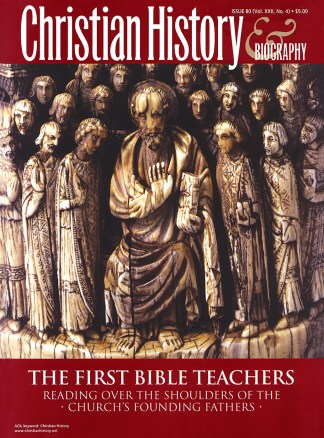The Reformers taught “Sola Scriptura,” which meant every person became their own Bible interpreter, right?
Wrong. We asked noted Reformation scholar David Steinmetz of Duke Divinity School about this. In this excerpt from our interview, he reminds us that the Reformers strove to ensure their own interpretations of Scripture matched those of the Fathers.
“The Reformation is an argument not just about the Bible but about the early Christian fathers, whom the Protestants wanted to claim. This is one of those things that is so obvious nobody has paid much attention to it—then you look and you see it everywhere.
“The Reformers use the Fathers all over the place. We know Calvin read Augustine, and we discovered recently that Luther read Jerome—he had copies annotated in his own hand. The index of Calvin’s Institutes is filled with an enormous number of quotations from the Fathers. And in the first preface to that work, addressed to Francis I, Calvin did his best to show his teachings were in complete harmony with the Fathers.
“The Protestants did this because they were keen to have ancestors. They knew that innovation was another word for heresy. ‘Ours is the ancient tradition,’ they said. ‘The innovations were introduced in the Middle Ages!’ They issued anthologies of the Fathers to show the Fathers had taught what the Reformers were teaching.
“But they also turned to the Fathers because they found them important sources of insight into the text of Scripture. Calvin and Melanchthon both believed it was a very strong argument against a given theological position if you couldn’t find authorization for it in the Fathers.
“All the Reformers loved Augustine (Luther, remember, was an Augustinian friar). Calvin, though he loved Augustine for doctrine, preferred Chrysostom’s approach to biblical interpretation.
“Chrysostom is a verse-by-verse commentator in his sermons. Calvin doesn’t mimic Chrysostom, but he appreciates his model.
Augustine flies a little too high above the text for Calvin—he is too quick to go to figures of speech, allegory, and so forth. Chrysostom flies at a lower level.
“Finally, the Reformation was not an argument about everything, but about just some things. It was not, for example, about the Trinity or the two natures of Christ. The Protestants had their own slant on these doctrines, but they agreed basically with Roman Catholics. Both confessed the Trinity and the two natures of Christ. And if we ask where these accepted doctrines came from—they came from the Fathers’ reflections on the Bible!”
Copyright © 2003 by the author or Christianity Today/Christian History magazine. Click here for reprint information on Christian History.










